|

Native Americans living on the rural and remote reservations of the Southwest struggle daily with isolation, limited employment opportunities, and a harsh and resource-poor environment. Many communities on these reservations are not accessible by paved roads, and are reachable only by four-wheel drive vehicles and in some instances even helicopters. Most tribal members receive no cash income from casinos, which provide few employment opportunities.
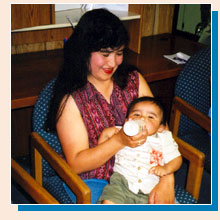 | | SWIRC services support the most fragile — especially infants, children, young mothers and Elders. | Poverty weighs heavily on those most fragile ’ especially infants, young children and young mothers, and Elders. The needs of this fragile population are huge.
The Southwest Indian Relief Council Program exists to bring support and encouragement to these Native Americans, who seek to live in dignity despite horrendous economic pressures. At the same time, we believe that it is important to provide help in a way that reduces dependency and draws on the strong sense of pride and community, so prevalent among Native American people.
While Katie Tree takes a well-deserved retirement, Lovena Lee was honored to be named as the new Chairperson. Lovena grew up in the Sweetwater area of the Navajo Reservation in Arizona and has worked for years in Southwest Native American communities. At an early age, Lovena learned the Navajo traditions, culture and history as told in stories passed from one generation to the next.
The intent of SWIRC services is to reduce immediate need on the reservations, while enhancing existing reservation programs and services. This dual focus builds for today and tomorrow, and creates more opportunities for positive change in reservation communities.
Here are the principles that guide our work.
-
SWIRC services work through reservation partners, who identify the needs in their communities that our services can help them address. These are our Program Partners. We provide goods and services to the partners, and work with them to plan and implement distributions and activities in their communities. This helps reduce the immediate need.
-
SWIRC services help Program Partners enhance the reservation programs where they work. By volunteering with us, the partners learn how to work with outside resources, organize and advertise events, and recruit and coordinate volunteers. Their volunteers also build skills and confidence. This learning benefits reservation programs in the long run.
-
SWIRC services give preference to rural and remote communities with limited access to transportation and services. Many who live on reservations reside in rural areas far away from health care, stores, schools, or employment opportunities. Many do not have transportation to get to the nearest town or facility. These are the areas that we prioritize for service.
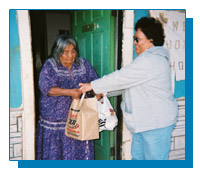 |  | We work with partners in the
communities that we serve. | We give preferentiality
to remote locations. |
-
When a group is selected for service, SWIRC services serve everyone in the group. In addition to need, a group may be further defined by age, location, the Partner’s service area, or other factors. These criteria make clear who is eligible to receive the service. Using this system helps to avoid any feeling of unfairness or partiality within the community that could undermine the effectiveness and credibility of SWIRC or our Program Partners.
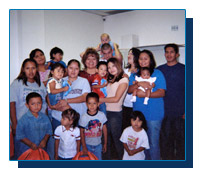 | 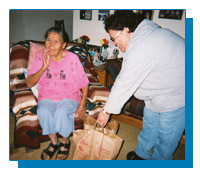 | We define a group to be served
and serve everyone in that group. | We insist upon
program accountability. |
-
The SWIRC Program delivers only needed goods and services. We work with Program Partners to understand what products are needed and in what quantities, then strive to match those needs with high-quality products. In other words, we do not "dump and run." Dumping goods merely because they are available doesn’t guarantee a benefit. Some goods are unwanted or inappropriate. Delivering the wrong thing at the wrong time or to the wrong place can create a problem for the community. Thus, the SWIRC Program only delivers to the Partners and only delivers goods that will help address the Partner’s need.
-
We insist upon program accountability. We expect our Program Partners to care as much about the goods and services provided as we do. Goods and services must go only to the defined group and be reported on by the Partners in a timely fashion. We fulfill our obligations to our Program Partners, and we expect our Program Partners to fulfill their obligations to us.
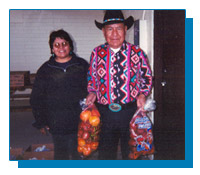 |  | We strive to match
Partners' needs with
high-quality products. | We only deliver to the Partners
and only deliver goods that will
help address the Partner’s need. |
-
The SWIRC Program gives clear, written expectations to its Program Partners. We rely heavily on the Program Partners and other volunteers who live on the reservation to make our program work. We clearly outline expectations as to what the community needs to do and what the SWIRC Program will do for them. Building this line of communication makes our services more effective because everyone’s expectations are clear.
-
The SWIRC Program is also accountable to our donors. We take seriously the management of resources that donors entrust to our care. We work efficiently and effectively year-round, to achieve the maximum reach and impact from available resources. This enables us to be a constant resource to Indian country and to the Partners who are counting on us.
|
Give us a chance to share our mission with you.
Already Registered? Log in

Learn how your donation helps
Gift Center

Give a gift of hope to a child or Elder living on impoverished remote Native American reservations in the Southwest.
So often, these vulnerable citizens are faced with a lack of hope for the future and now you can choose the perfect gift to brighten their lives. Shop Now
Planned Giving
Did you know that it is possible to assist Native Americans without it costing you anything during your lifetime.

Learn More
|